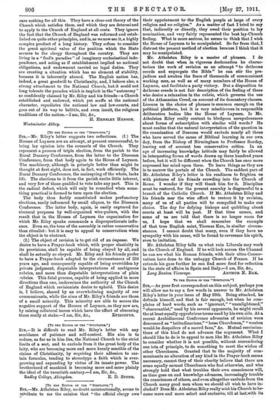[To THE EDITOR Or THE " SPECTATOR.1
Sin,—Mr. Athelstan Riley, no doubt unintentionally, seems to etheibute to me the opinion that " the official clergy owe
their appointment to the English people at large of every religion and no religion." As a matter of fact I tried to say that, indirectly or directly, they owed• their position to lay nomination, and very fairly represented the best lay-Church feeling. What is more serious, he seems to think that I wish the House of Laymen to be manipulated. So far from that, I distrust the present method of election because I think that it may be manipulated.
Mr. Athelstan Riley is a master of phrases. I do not doubt that when in vigorous declamation he charac- terizes the work of revision as an attempt " to dethrone creeds and expurgate the Bible" he can stir the pre- judices and awaken the fears of thousands of communicant working men, as well as of many members of the House of Laymen, and facilitate a party victory. But a disposition to dethrone creeds is not fair description of the feeling of those who desire a relaxation in the rubric, which governs the use of the Athanasian Creed, on account of its damnatory clauses. Licence in the choice of phrases is common enough on the political platform, but it is very mischievous in responsible deliberative bodies like the House of Laymen. Is Mr. Athelstan Riley really content to bludgeon scrupulousness about forms of subscription with similar wild words ? He must realize that the natural interpretation of the question in the examination of Deacons would exclude nearly all those who have served the cause of Biblical learning in our own day, from the Bishop of Birmingham to Professor Sanday, leaving out of account less conservative critics. In an age of increasing knowledge latitude may fairly be allowed in interpreting forms of words drawn up three hundred years before, but it will be different when the Church has once more expressed her mind upon them. To leave things as they are is to narrow the portals of the Church. The saddest part of Mr. Athelstan Riley's letter is his readiness to frighten us with pictures of his friends crowding into the Church of Rome. I wonder if they will thank him for it. Discipline must be restored, for the present anarchy is disgraceful to a branch of the Catholic Church. If Mr. Athelstan Riley and his friends mar the wise effort to restore it by revision, many of us of all parties will be compelled to make our choice. The day for defying bishops and quibbling about courts at least will be past. If that time comes, and some of us are told that there is no longer room for us, I hope that we shall remember the example of that true English saint, Thomas Ken, in similar circum- stances. I cannot doubt that many, even if they have no sympathy with his cause, will be found to reverence his spirit, even to imitation.
Mr. Athelstan Riley tells us what ruin Liberals may work in the Church of England. If he will look across the Channel he can see what his Roman friends, with their ultra-Conser- vatism have done to the unhappy Church of France. If he extends his gaze further he can find more food for reflection in the state of affairs in Spain and Italy.—I am, Sir, Sze.,










































 Previous page
Previous page